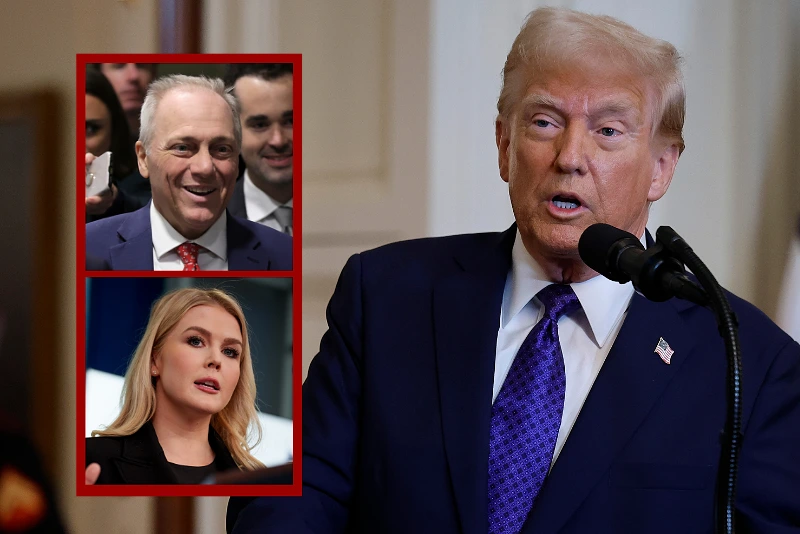

OAN Staff Brooke Mallory
5:03 PM – Thursday, February 6, 2025
In regards to ending taxes on tips, overtime, and Social Security payments, and to raise the $10,000 state and local tax deduction threshold, President Donald Trump asked Congressional Republican leaders to terminate tax benefits for hedge fund managers and affluent owners of sports teams.
Advertisement
“This will be the largest tax cut in history for middle-class, working Americans,” White House Press Secretary Karoline Leavitt told reporters as Trump met with GOP leaders in the West Wing.
Leavitt referred to Trump’s Thursday requests as the administration’s “tax priorities” — as she read from a prepared list for approval by the Republican-controlled House and Senate.
“No tax on tips, which is obviously a very public campaign promise that the president made. No tax on seniors’ Social Security, no tax on overtime pay, renewing President Trump’s 2017 middle-class tax cuts,” Leavitt stated.
“Adjusting the SALT cap; Eliminat[ing] all the special tax breaks for billionaire sports team owners; Clos[ing] the carried interest tax deduction loophole [and] Tax cuts for ‘Made in America’ products,” she added.
House and Senate leaders have already had back-and-forth discussions on the appropriate course of action; therefore, it’s uncertain if all of the topics will be included in the legislation that is currently pending.
Trump spent more than five hours on Thursday huddled with lawmakers.
“We got into a lot of detail on what we need to do both for the budget and the reconciliation side,” House Majority Leader Steve Scalise (R-La.) told the press. “President Trump was very engaged throughout the meeting, and we are narrowing down the areas [of] differences.”
“We spent a lot of time on a whiteboard, literally putting down different numbers so we could all be on the same page.”
The Majority leader didn’t downright mention if there were any breakthroughs, but he did say that “we made serious progress” and lawmakers are “very close to bringing this to Budget Committee.”
The House Budget Committee postponed plans to mark up a resolution this week that would open the Senate reconciliation process that the party expects to utilize to enact the expansive Trump agenda — while avoiding a Democratic filibuster.
Republicans in the upper house are vying for control of Trump’s agenda package after Senate Budget Committee Chairman Lindsey Graham (R-S.C.) declared plans to pursue an alternative budget resolution in the wake of the delay, according to The Post.
By adopting this, Graham would adopt the Senate GOP’s favored two-bill strategy, which consists of a first tranche of energy, defense, and border changes followed by a second tax package.
Since Congress can normally only pass one budget reconciliation bill per fiscal year, the second package would probably have a harder time getting 60 votes in the Senate and would need to win over Democrats.
Johnson supports including Trump’s demands into a comprehensive budget reconciliation bill that can be approved by both chambers with a slim majority. Due to the tax provisions, the bill would need to be taken up by the House first.
“I think we’ll be able to make some announcements, probably by tomorrow, and we’re excited about that,” Johnson told the press. “The idea would be to get the budget committee working potentially as early as early next week, maybe Tuesday, for a markup for the budget resolution.”
The question of whether to include a debt limit rise in the larger Trump agenda package or to pursue it separately has also caused division among some Republicans. Democrats stated that if they choose the latter, they would be eager to make compromises if there aren’t enough conservative Republicans on board.
Nevertheless, the White House meeting “made a lot of progress on that,” Scalise reiterated.
Although Congress is not anticipated to face a deadline for extending the debt limit until June, it was suspended until the beginning of last month.
Trump’s tax appeals to workers and retirees, in part, helped him win the 2024 election—and he has attributed his proposal to eliminate tips on taxes with being the first Republican to win in Nevada in 20 years.
Scalise acknowledged that “we didn’t solve the SALT problem, but we got probably closer even on that issue.”
Some, but not all, of the revenue losses would be compensated for by Trump’s call to address loopholes that favor hedge fund managers and owners of sports teams.
According to Americans for Financial Reform, the carried-interest reform would generate between $1.4 billion and $18 billion annually by treating the salary of investment mavens as income rather than private equity gains that are subject to lower tax rates.
Although the exact amount that the government would receive back from the sports owner tax changes is unclear, it is likely to be in the billions, experts say.
Currently, owners can deduct the whole franchise acquisition amount over a 15-year period from their tax obligations. The Washington Commanders football franchise sold for a record $6.05 billion in 2023, demonstrating the size of those deals.
In addition to tax-exempt municipal loans for pro sports stadiums, which cost the government around $4.3 billion in lost income, sports club owners also receive other federal benefits.
Stay informed! Receive breaking news blasts directly to your inbox for free. Subscribe here. https://www.oann.com/alerts
Advertisements below

